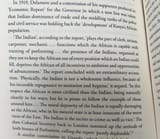Anonymous
ID: nvayGMMo
7/9/2025, 4:47:38 PM No.509923378
Check out how much Indians have changed since the 16h century, surely the future is bright:
French account (16th c.)
>Indian craftsmen…were ‘indolent’ and ‘vile’ by their very nature
Jemima Kindersley (1760s)
>In her letters she refers to Indians as having “stupidity and low cunning,” framing them as inherently backward
Abbe J.A. Dubois (early 19th c.)
>described Hindu customs as "abominable and revolting," compared Hindus to cannibals, calling their habits "disgusting" and their food "revolting."
Rev. Hobart Caunter (1834)
>described the Bengalese as "notoriously licentious" and hill men as "servile, deceptive and cunning, utterly without honour or principle"
Charles Grant & James Mill (early 19th c.)
>Grant described Hindus as “a people exceedingly depraved,” and ridiculed Sanskrit medicine, astronomy, history, and geography as laughable nonsense. James Mill called Indians contemptuously “cowardly, unfeeling and mendacious”
John Bacon (1840)
>Bacon describes Hindus as “inert” and filled with “low cunning,” “superstition” and “fulsome sycophancy.” He complains their language is “a heap of allegories,” condemns Hindu beliefs as “absurd” and “monstrous,” and portrays the entire group as lacking compassion compared to the British
Charles Dickens (mid-19th c.)
>In a private correspondence, Dickens described Indians: “Look at the dogs, low, treacherous, murderous, tigerous villains.” He even endorsed extreme violence, calling for the “extermination” of Indian people and approving the mutilation of “wretched Hindoo”
Sir Richard Francis Burton (1850s travelogues)
>Indians are a “cowardly and slavish people”
Blackwood’s Magazine (1850s)
>Indians are “dark-skinned rapists,” “rapacious savages menacing the virtue of Britain”
Mark Twain (1897)
>expressed disgust at the Ganges, stating, "the memory of that sight will always stay by me, but not by request"
French account (16th c.)
>Indian craftsmen…were ‘indolent’ and ‘vile’ by their very nature
Jemima Kindersley (1760s)
>In her letters she refers to Indians as having “stupidity and low cunning,” framing them as inherently backward
Abbe J.A. Dubois (early 19th c.)
>described Hindu customs as "abominable and revolting," compared Hindus to cannibals, calling their habits "disgusting" and their food "revolting."
Rev. Hobart Caunter (1834)
>described the Bengalese as "notoriously licentious" and hill men as "servile, deceptive and cunning, utterly without honour or principle"
Charles Grant & James Mill (early 19th c.)
>Grant described Hindus as “a people exceedingly depraved,” and ridiculed Sanskrit medicine, astronomy, history, and geography as laughable nonsense. James Mill called Indians contemptuously “cowardly, unfeeling and mendacious”
John Bacon (1840)
>Bacon describes Hindus as “inert” and filled with “low cunning,” “superstition” and “fulsome sycophancy.” He complains their language is “a heap of allegories,” condemns Hindu beliefs as “absurd” and “monstrous,” and portrays the entire group as lacking compassion compared to the British
Charles Dickens (mid-19th c.)
>In a private correspondence, Dickens described Indians: “Look at the dogs, low, treacherous, murderous, tigerous villains.” He even endorsed extreme violence, calling for the “extermination” of Indian people and approving the mutilation of “wretched Hindoo”
Sir Richard Francis Burton (1850s travelogues)
>Indians are a “cowardly and slavish people”
Blackwood’s Magazine (1850s)
>Indians are “dark-skinned rapists,” “rapacious savages menacing the virtue of Britain”
Mark Twain (1897)
>expressed disgust at the Ganges, stating, "the memory of that sight will always stay by me, but not by request"
Replies:


